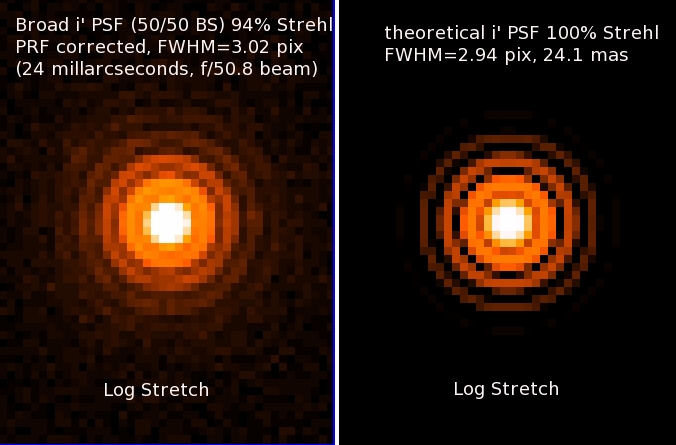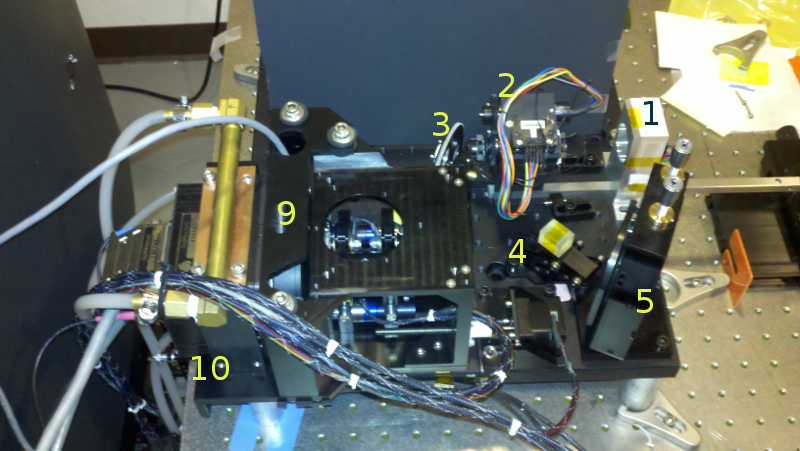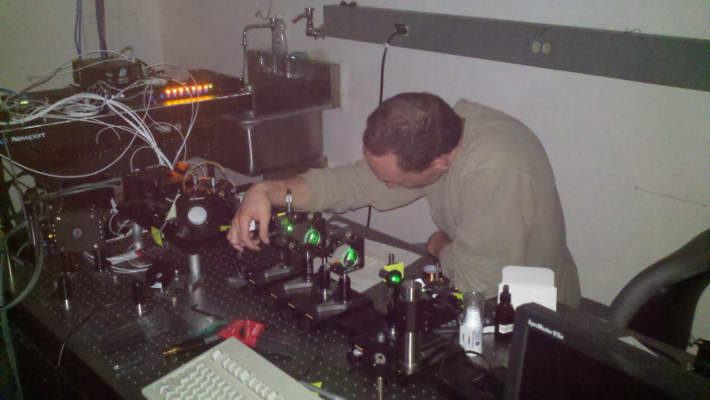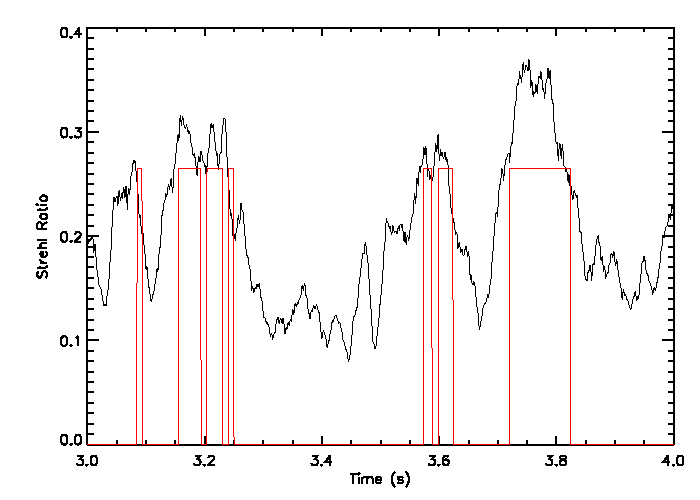- 2011-03-18
Jared Males

On March 10, 2011 the MagAO secondary shell had its frontside successfully aluminized at the University of Arizona, Steward Observatory coating facility in Tucson by Richard Sosa and Gary Rosenbaum. This also took a lot of hard work by Jason Lewis and Victor Gasho.
- 2011-03-18
Jared Males

After completing our work with the laser, we switched to a white light source to test the camera’s performance in broad band filters. This is our PSF in the Sloan Digitial Sky Survey (SDSS) i’ filter (a nice set of filter curves is here), which passes light from roughly 0.684 to 0.840 microns. ...
- 2011-03-06
Jared Males

After a very intense couple of weeks, we have built up the nearly complete VisAO camera in the Magellan AO Lab at Steward Observatory. The images below show the hardware mounted on the board. Missing is the wavefront sensor (WFS) hardware, which is waiting for us in Florence, Italy.
The numbers label specific components:
1: ...
- 2011-01-30
Jared Males

On Friday we performed a focus test of the VisAO camera for the first time. We are so far very happy with the results, as it looks like the focus position of our CCD stage is right about where it should be. This experiment was the first time we had the optics, ...
- 2011-01-19
Kate Follette
The Magellan fit check run at Las Campanas in December was a success! See the summary document for details.
- 2010-12-01
Jared Males
Here is a demo of our filter wheel assembly (designed by Kevin Brutlag and assembled by Jason Lewis) spinning under the control of the AO Supervisor software.
- 2010-10-27
Jared Males

Here’s a short video of our “smart” shutter in action. In this test it is responding to a simulated Strehl ratio time series, showing that it is fast and accurate enough to perform real-time frame selection – essentially lucky imaging without the luck.
This plot shows that the shutter was open when Strehl was high ...
 On March 10, 2011 the MagAO secondary shell had its frontside successfully aluminized at the University of Arizona, Steward Observatory coating facility in Tucson by Richard Sosa and Gary Rosenbaum. This also took a lot of hard work by Jason Lewis and Victor Gasho.
On March 10, 2011 the MagAO secondary shell had its frontside successfully aluminized at the University of Arizona, Steward Observatory coating facility in Tucson by Richard Sosa and Gary Rosenbaum. This also took a lot of hard work by Jason Lewis and Victor Gasho. After completing our work with the laser, we switched to a white light source to test the camera’s performance in broad band filters. This is our PSF in the Sloan Digitial Sky Survey (SDSS) i’ filter (a nice set of filter curves is here), which passes light from roughly 0.684 to 0.840 microns. ...
After completing our work with the laser, we switched to a white light source to test the camera’s performance in broad band filters. This is our PSF in the Sloan Digitial Sky Survey (SDSS) i’ filter (a nice set of filter curves is here), which passes light from roughly 0.684 to 0.840 microns. ... After a very intense couple of weeks, we have built up the nearly complete VisAO camera in the Magellan AO Lab at Steward Observatory. The images below show the hardware mounted on the board. Missing is the wavefront sensor (WFS) hardware, which is waiting for us in Florence, Italy. The numbers label specific components: 1: ...
After a very intense couple of weeks, we have built up the nearly complete VisAO camera in the Magellan AO Lab at Steward Observatory. The images below show the hardware mounted on the board. Missing is the wavefront sensor (WFS) hardware, which is waiting for us in Florence, Italy. The numbers label specific components: 1: ... On Friday we performed a focus test of the VisAO camera for the first time. We are so far very happy with the results, as it looks like the focus position of our CCD stage is right about where it should be. This experiment was the first time we had the optics, ...
On Friday we performed a focus test of the VisAO camera for the first time. We are so far very happy with the results, as it looks like the focus position of our CCD stage is right about where it should be. This experiment was the first time we had the optics, ... Here’s a short video of our “smart” shutter in action. In this test it is responding to a simulated Strehl ratio time series, showing that it is fast and accurate enough to perform real-time frame selection – essentially lucky imaging without the luck. This plot shows that the shutter was open when Strehl was high ...
Here’s a short video of our “smart” shutter in action. In this test it is responding to a simulated Strehl ratio time series, showing that it is fast and accurate enough to perform real-time frame selection – essentially lucky imaging without the luck. This plot shows that the shutter was open when Strehl was high ...